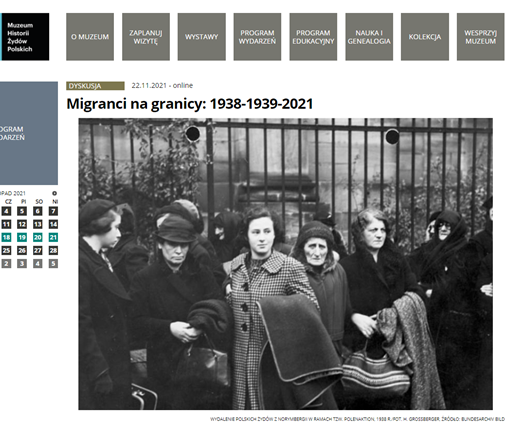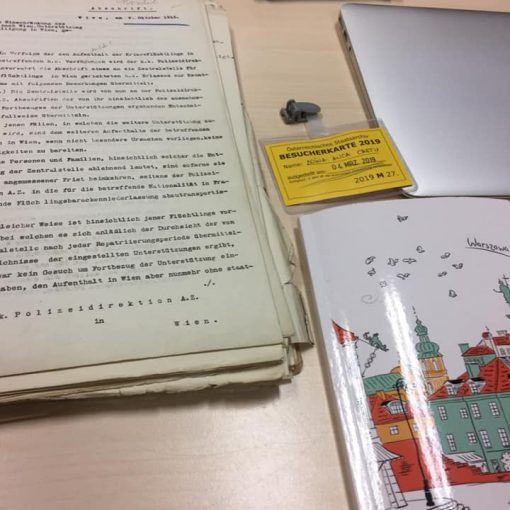April 4, 20, 27 and May 4, 2020
Despite the recent research and publication boom, the field of migration history has never been a core topic of Cold War studies, even though it is increasingly studied and revisited. A traditional narrative on refugees in Cold War Europe clearly follows the East-West divide: Eastern Europeans fled communist dictatorships and were generously welcomed as political asylum seekers in the “Free World.” This Western-oriented perception is currently revisited by many scholars around the world. However, the UnRef’s geographical focus on East-Central Europe calls for an even broader reassessment. Indeed, the socialist states did not only produce refugees but also served as a refuge for various groups like Greek Civil War refugees, Koreans or communists from Italy or Spain. Some of the resulting questions that guided our discussions were: What role did ideology (and the deriving solidarity) play in refugee policies? How did refugee regimes behind the “Iron Curtain” look like? What are the potential avenues of East-West comparison across the “Iron Curtain”? And, finally, how can the Cold War period be integrated into a broader historical perspective on East-Central Europe as a refuge in the twentieth century?
Propelled by these questions, our discussions departed from a review of recent developments in Cold War studies. We continued by delving into research in the history of Displaced Persons and the making of the 1951 Geneva Convention to see how refugees had become an instrument of the incipient Cold War confrontation. Anti-communist solidarity shaped the Western (including Austrian) attitudes toward refugees from Eastern Europe at least for the first three decades of the Cold War. The reception of, for example, Greek Civil War refugees in Hungary, Czechoslovakia, and East Germany and, for example, of the 1956 Hungarian refugees in Austria and further West could be a starting point for East-West comparison.
Changing global migrations patterns and the reception of refugees from the global south in Europe constituted another issue we approached thoroughly. We discussed the case of Chilean refugees after the coup against Salvador Allende in 1973. Both East and West European countries received these refugees, and for the West, this meant a deviation from the pattern of welcoming refugees from communism. Their reception in East and West offers avenues for comparison of refugee regimes and societal reactions to non-European refugees.
We also explored the concept of “social citizenship” to shed light on refugee reception and integration, across the ideological blocs. How and to what degree did the countries granting asylum aimed at integrating refugees into their national legal, labor and welfare systems? While more research is needed, we hope that these questions will enrich the understanding of East-Central Europe as a refuge in the Cold War.
Readings:
Session 1: Cold War History and post-1945 Migration
2363703
{2363703:DRA6M2IC}
items
1
chicago-fullnote-bibliography
default
asc
https://www.unlikely-refuge.eu/wp-content/plugins/zotpress/
Westad, Odd Arne. “The Cold War and the International History of the Twentieth Century.” In The Cambridge History of the Cold War, Vol. 1. Cambridge: Cambridge University Press, 2010.
2363703
{2363703:6E8G4UU6}
items
1
chicago-fullnote-bibliography
default
asc
https://www.unlikely-refuge.eu/wp-content/plugins/zotpress/
Bresselau von Bressensdorf, Agnes. “Einleitung.” In Über Grenzen. Migration Und Flucht in Globaler Perspektive Seit 1945, edited by Agnes Bresselau von Bressensdorf, 9–28. Göttingen: Vandenhoeck & Ruprecht, 2019.
2363703
{2363703:IH8PTBKV}
items
1
chicago-fullnote-bibliography
default
asc
https://www.unlikely-refuge.eu/wp-content/plugins/zotpress/
Marrus, Michael Robert. The Unwanted: European Refugees from the First World War Through the Cold War. Philadelphia: Temple University Press, 2002.
Session 2: Postwar and the Manifold Origins of the 1951 Refugee Convention
2363703
{2363703:3B75PHT2}
items
1
chicago-fullnote-bibliography
default
asc
https://www.unlikely-refuge.eu/wp-content/plugins/zotpress/
Ben-Nun, Gilad. “From Ad Hoc to Universal: The International Refugee Regime from Fragmentation to Unity 1922–1954.” Refugee Survey Quarterly, no. 1 (2015): 1–22.
2363703
{2363703:3MMWZ4AW}
items
1
chicago-fullnote-bibliography
default
asc
https://www.unlikely-refuge.eu/wp-content/plugins/zotpress/
Janco, Andrew Paul. “‘Unwilling’: The One-Word Revolution in Refugee Status, 1940–51.” Contemporary European History 23, no. 3 (2014): 429–46.
2363703
{2363703:6V96W7DU}
items
1
chicago-fullnote-bibliography
default
asc
https://www.unlikely-refuge.eu/wp-content/plugins/zotpress/
Loescher, Gil. The UNHCR and World Politics. A Perilous Path. Reprinted. Oxford: Oxford University Press, 2006.
2363703
{2363703:CI664WKD}
items
1
chicago-fullnote-bibliography
default
asc
https://www.unlikely-refuge.eu/wp-content/plugins/zotpress/
Cohen, Gerard Daniel. “Battle of the Refugees. Displaced Persons and the Making of the Cold War West.” In War’s Wake: Europe’s Displaced Persons in the Postwar Order, 13–34. Oxford: Oxford University Press, 2011.
Session 3: Ideology and Solidarity: Case Studies and Long-term Perspectives from Cold War Europe
2363703
{2363703:A5Y8U288}
items
1
chicago-fullnote-bibliography
default
asc
https://www.unlikely-refuge.eu/wp-content/plugins/zotpress/
Poutrus, Patrice. “Postwar German Asylum Policy. The Crucial Case of the Chilean Refugees of 1973 and Subsequent Developments.” In Über Grenzen. Migration Und Flucht in Globaler Perspektive Seit 1945, edited by Agnes Bresselau von Bressensdorf, 225–40. Göttingen: Vandenhoeck & Ruprecht, 2019.
2363703
{2363703:PMTLPJHR}
items
1
chicago-fullnote-bibliography
default
asc
https://www.unlikely-refuge.eu/wp-content/plugins/zotpress/
Bösch, Frank. “Refugees Welcome? The West German Reception of Vietnamese ›Boat People‹.” Zeithistorische Forschungen/Studies in Contemporary History 14 (2017): 1–29.
2363703
{2363703:2IC2Q6GN}
items
1
chicago-fullnote-bibliography
default
asc
https://www.unlikely-refuge.eu/wp-content/plugins/zotpress/
Cooke, Philip. “Red Spring: Italian Political Emigration to Czechoslovakia.”
The Journal of Modern History 84, no. 4 (2012): 861–96.
https://doi.org/10.1086/667680.
Session 4: Social Citizenship, Welfare State and Integration: Case Studies from Cold War Europe
2363703
{2363703:LTSMVPEW}
items
1
chicago-fullnote-bibliography
default
asc
https://www.unlikely-refuge.eu/wp-content/plugins/zotpress/
Byström, Mikael. “When the State Stepped into the Arena: The Swedish Welfare State, Refugees and Immigrants 1930s–50s.”
Journal of Contemporary History 49, no. 3 (July 1, 2014): 599–621.
https://doi.org/10.1177/0022009414528259.
2363703
{2363703:QFN5MJS5}
items
1
chicago-fullnote-bibliography
default
asc
https://www.unlikely-refuge.eu/wp-content/plugins/zotpress/
Marshall, T. H. Citizenship and Social Class, and Other Essays. Cambridge: University Press, 1950.



